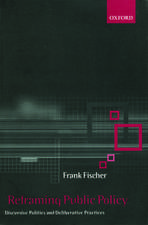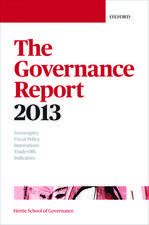Green Politics in Japan: Nissan Institute/Routledge Japanese Studies
Autor Lam Peng-Eren Limba Engleză Hardback – 21 ian 1999
| Toate formatele și edițiile | Preț | Express |
|---|---|---|
| Paperback (1) | 277.78 lei 6-8 săpt. | |
| Taylor & Francis – 9 iun 2015 | 277.78 lei 6-8 săpt. | |
| Hardback (1) | 701.56 lei 6-8 săpt. | |
| Taylor & Francis – 21 ian 1999 | 701.56 lei 6-8 săpt. |
Din seria Nissan Institute/Routledge Japanese Studies
-
 Preț: 286.69 lei
Preț: 286.69 lei -
 Preț: 310.80 lei
Preț: 310.80 lei - 9%
 Preț: 1003.95 lei
Preț: 1003.95 lei -
 Preț: 289.04 lei
Preț: 289.04 lei - 25%
 Preț: 852.53 lei
Preț: 852.53 lei -
 Preț: 495.94 lei
Preț: 495.94 lei -
 Preț: 486.42 lei
Preț: 486.42 lei -
 Preț: 271.61 lei
Preț: 271.61 lei -
 Preț: 420.08 lei
Preț: 420.08 lei - 18%
 Preț: 1057.40 lei
Preț: 1057.40 lei -
 Preț: 465.49 lei
Preț: 465.49 lei -
 Preț: 414.39 lei
Preț: 414.39 lei - 18%
 Preț: 1003.30 lei
Preț: 1003.30 lei - 18%
 Preț: 1056.80 lei
Preț: 1056.80 lei -
 Preț: 465.69 lei
Preț: 465.69 lei -
 Preț: 415.24 lei
Preț: 415.24 lei -
 Preț: 485.40 lei
Preț: 485.40 lei - 12%
 Preț: 299.87 lei
Preț: 299.87 lei - 18%
 Preț: 1061.57 lei
Preț: 1061.57 lei - 18%
 Preț: 1105.56 lei
Preț: 1105.56 lei - 18%
 Preț: 1058.43 lei
Preț: 1058.43 lei - 18%
 Preț: 1058.79 lei
Preț: 1058.79 lei - 18%
 Preț: 1168.76 lei
Preț: 1168.76 lei - 15%
 Preț: 538.45 lei
Preț: 538.45 lei -
 Preț: 415.67 lei
Preț: 415.67 lei - 26%
 Preț: 820.32 lei
Preț: 820.32 lei - 15%
 Preț: 511.27 lei
Preț: 511.27 lei -
 Preț: 492.11 lei
Preț: 492.11 lei - 18%
 Preț: 1271.47 lei
Preț: 1271.47 lei -
 Preț: 438.47 lei
Preț: 438.47 lei -
 Preț: 451.16 lei
Preț: 451.16 lei - 23%
 Preț: 342.12 lei
Preț: 342.12 lei -
 Preț: 408.54 lei
Preț: 408.54 lei - 18%
 Preț: 948.98 lei
Preț: 948.98 lei -
 Preț: 412.37 lei
Preț: 412.37 lei - 25%
 Preț: 1001.60 lei
Preț: 1001.60 lei - 18%
 Preț: 1061.57 lei
Preț: 1061.57 lei - 26%
 Preț: 849.77 lei
Preț: 849.77 lei - 26%
 Preț: 820.73 lei
Preț: 820.73 lei - 18%
 Preț: 1057.05 lei
Preț: 1057.05 lei - 18%
 Preț: 1390.04 lei
Preț: 1390.04 lei - 18%
 Preț: 777.70 lei
Preț: 777.70 lei
Preț: 701.56 lei
Preț vechi: 855.56 lei
-18% Nou
Puncte Express: 1052
Preț estimativ în valută:
134.25€ • 139.26$ • 111.94£
134.25€ • 139.26$ • 111.94£
Carte tipărită la comandă
Livrare economică 27 martie-10 aprilie
Preluare comenzi: 021 569.72.76
Specificații
ISBN-13: 9780415199384
ISBN-10: 0415199387
Pagini: 240
Dimensiuni: 138 x 216 x 23 mm
Greutate: 0.48 kg
Ediția:New.
Editura: Taylor & Francis
Colecția Routledge
Seria Nissan Institute/Routledge Japanese Studies
Locul publicării:Oxford, United Kingdom
ISBN-10: 0415199387
Pagini: 240
Dimensiuni: 138 x 216 x 23 mm
Greutate: 0.48 kg
Ediția:New.
Editura: Taylor & Francis
Colecția Routledge
Seria Nissan Institute/Routledge Japanese Studies
Locul publicării:Oxford, United Kingdom
Public țintă
PostgraduateCuprins
Preface.L Tables.L Figures.L 1. Introduction 2. The Liberal Democratic Party and Urban Political Machines 3. The Liberal Democratic Party's Quest for Local Policy-Making Party Organization 4. The Japanese Communist Party: Organization and Resilience 5. Social Movements and the Seikatsu Club 6. Origins of the Seikatsu Club 7. Seikatsu Club: Idelology and Organization 8. The Network Movement: A Japanese Green Party? 9. The Seikatsu Club and NET: Problems and Prospects 10. Conclusion.L Bibliography.L Interviews.L Index
Descriere
Green Politics in Japan reveals that green issues have yet to displace the traditional urban politics of post-industrial Japan. Indeed, it seems that political values are still informed by the conservative values of hierarchy and deference




















